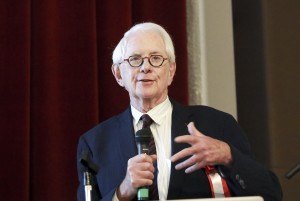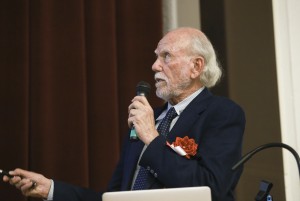It really was a “hot” day.
In 2018 so far, Tokyo had 67 days of temperatures above 30 degrees Celsius, and 5 August recorded the highest temperature of 34.1 degrees. Despite such a terribly hot weather, Kiin-do Hall at Ochanomizu University in Tokyo was crowded with about 1000 enthusiastic spectators who gathered for the ILC promoting symposium featuring two Nobel laureates, Sheldon Glashow, and Barry Barish.
After an introduction by Yuichi Takayanagi, master of ceremony for the event, former head of communications at KEK and now director of the Tama-Rokuto Science Museum in Tokyo, Barish started his lecture entitled “International Linear Collider, the world’s most important particle physics project.” Barish explained science and technology around the ILC, and other science projects around world.
He started his talk saying “most of the people involved in particle physics understand that we need a machine of the future, and that is the International Linear Collider.” Barish was asked in 2004 to serve on the panel that chose the design technology for the linear collider, even though he was in the middle of constructing a gravitational wave detector, LIGO, that gave him his Nobel Prize. “It is a very interesting, challenging and innovative design.”
For over seven years of Global Design Effort, which was the exact name of the organisation founded after the technology decision, experts from all over the world worked together. With many innovations and technological advances, the ILC is now ready for construction. “We are hoping the ILC gets built in Japan as an international project. People from all over the world will come to work in this laboratory. It will bring to Japan all the technologies and expertise we developed, in a dynamic new place. So, I hope, and this is the reason why I am here, we will see in the near future the decision to build the ILC in Japan,” he concluded.

Sheldon Glashaw calls the importance of trying to understanding the universe into which we were born a “sacred obligation” Image: Yukio Yanagi
Glashow talked about the significance of the ILC from the viewpoint of a theoretical physicist. “We need the ILC, is the title of my talk. It is on my own initiative that I travelled over 10,000 kilometres to attend this meeting, and encourage the construction of the ILC.” He said that the ILC is “absolutely essential,” and if constructed, it would be the centre of particle physics research for decades. He also said the ILC is not just for particle physics: “ILC will foster Japanese science,” not only developing human resources and new technologies, but he predicts that spin-offs from the research will spread to other fields.
Two Japanese Nobel laureates, Masatoshi Koshiba (2002 Nobel Prize in Physics), and Yoshinori Osumi (2016 Nobel Prize in medicine) provided video messages. Koshiba said: “We will never know what the ILC means to us until we actually build it. But it will be a great pleasure for physicists if the ILC is built in Japan or anywhere in the world, because it will open up new possibilities.” Osumi raised an alarm when he won the Nobel Prize in 2016 that there would be no more Japanese Nobel Prize winners without a change in Japanese education system. “I think the Japanese education system puts too much importance on efficiency, expecting quick results from research,” he said. “But science is at the opposite end of efficiency. Japan should allow young people to challenge the unknown, otherwise there will be no one with a challenging mind in the future.” He also said that Japan is standing at the point to think about the way the country should go in science. “It is important that there are advantageous areas of research where Japan could contribute. I think particle physics is one of them.”
Here you can watch all talks at the ILC symposium:
View also Nobel Laureates’ support to the ILC on our Youtube channel:


Recent Comments